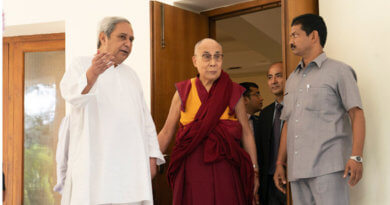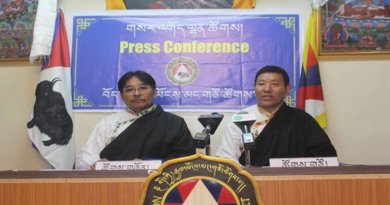CTA Denounces China’s White Paper On Tibet, Calls It Unacceptable
By Tsering Choephel

DHARAMSALA, 14 Nov: The Central Tibetan Administration (CTA), commonly known as the Tibetan government in exile, has denounced the Communist Party of China’s (CPC) latest propaganda document, the White Paper on Tibet, as filled with “misconceptions, misinterpretations, and lies”, rendering it “unacceptable.”
China’s State Council Information Office released a white paper titled “CPC Policies on the Governance of Xizang in the New Era: Approach and Achievements” on 10 November, which Chinese state-run media Xinhua ostentatiously reported to have highlighted “all-round progress and historic success in various undertakings in the region.”
CTA’s spokesperson, Tenzin Lekshey said that “the consistent use of the term Xizang in place of Tibet throughout this white paper is most striking” and called this move China’s “attempt to dissociate Tibet from Tibetans and the international community.”
The replacement of the term ‘Tibet’ by ‘Xizang’ in reference to the CCP-demarcated Tibet Autonomous Region was proposed in August of this year at the so-called International Tibetan Studies seminar held in Beijing. Seemingly prearranged and ordered from the higher authority of the CCP, the move has been expedited.
The 32-page document, like all previous white papers on Tibet since 1992, boasts and brags about the development China has brought into Tibet and how the lives of Tibetan people have been immensely improved under the Party.
Lekshey, during his interview on TibetTV, the official broadcasting channel of the CTA, emphasised that the aspirations the white paper speaks about include only those Tibetans within the TAR, while the CTA talks about the aspirations of Tibetans all across the region.
“Though the document talks about the aspirations of people, somehow the Tibetan people are missing. We wonder what kind of aspirations they are talking about and whose aspirations they are referring to,” he said, questioning the true beneficiaries of all the infrastructural development the document elaborated on.
The Tibetan people’s aspiration, Lekshey said, is “longing for freedom to exercise and preserve Tibetan language and its cultural identity.”
The use of phrases like “promotion of the rule of law” and “democratic values” by the CPC in documents regarding its rule of Tibet stands in extreme contrast to its actual practices, says the spokesperson. “In practice, the Party stands above the law, introducing many draconian laws, such as the recently implemented order no.19 and order no.5, previously for the convenience and stability of the Party itself.”
Another significant matter of concern in the document is the reincarnation process of the 14th Dalai Lama. Lekshey reiterated the CTA’s stand that “only His Holiness the Dalai Lama himself has the sole authority to decide about his reincarnation” and said “China’s proclamation that Dalai Lama’s reincarnation should be found within the country, with the use of the golden urn and be approved by the government, violates the traditional customs and rights of Tibetans.”
Furthermore, the spokesperson lamented China’s continued vilification of the Dalai Lama as a separatist. “Despite the fact that His Holiness is the key to bringing stability in Tibet, CCP continues to reject his position,” emphasising that “China’s meddling in His Holiness’ reincarnation is simply a political manoeuvre.”
The White Paper, CCP’s propaganda document, whitewashes all the brutality and suffering its rule has brought to Tibet since its occupation. The CCP’s continuing persecution of the Tibetan way of life, whether in language, religion, or culture, through the use of draconian laws, unlawful means, and strict surveillance—all of it represents their Black Book of how they actually govern the Tibetan people






